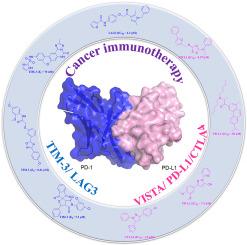当前位置:
X-MOL 学术
›
Eur. J. Med. Chem.
›
论文详情
Our official English website, www.x-mol.net, welcomes your
feedback! (Note: you will need to create a separate account there.)
Small molecule inhibitors targeting PD-L1, CTLA4, VISTA, TIM-3, and LAG3 for cancer immunotherapy (2020–2024)
European Journal of Medicinal Chemistry ( IF 6.0 ) Pub Date : 2024-12-05 , DOI: 10.1016/j.ejmech.2024.117141 Binbin Cheng, Jinke Lv, Yao Xiao, Changshan Song, Jianjun Chen, Chuxiao Shao
European Journal of Medicinal Chemistry ( IF 6.0 ) Pub Date : 2024-12-05 , DOI: 10.1016/j.ejmech.2024.117141 Binbin Cheng, Jinke Lv, Yao Xiao, Changshan Song, Jianjun Chen, Chuxiao Shao

|
Cancer immunotherapy, leveraging antibodies, excels in targeting efficacy but faces hurdles in tissue penetration, oral delivery, and prolonged half-life, with costly production and risk of adverse immunogenic effects. In contrast, small molecule immuno-oncology agents provide favorable pharmacokinetic properties and benign toxicity profiles. These agents are well-positioned to address the limitations of antibody-based immunotherapies, augment existing treatment modalities, and achieve synergistic effects when combined with antibodies. This review, for the first time, summarizes the recent advances (2020–2024) in small molecule inhibitors targeting PD-1/PD-L1, CTLA4, VISTA, TIM-3, and LAG3, highlighting rational design, benefits, and potential limitations. It also outlines the prospects for small-molecule immunotherapy.
中文翻译:

靶向 PD-L1、CTLA4、VISTA、TIM-3 和 LAG3 的小分子抑制剂用于癌症免疫治疗 (2020–2024)
利用抗体的癌症免疫疗法在靶向效果方面表现出色,但在组织渗透、口服递送和延长半衰期方面面临障碍,生产成本高昂,存在免疫原性不良反应的风险。相比之下,小分子免疫肿瘤学药物具有良好的药代动力学特性和良性毒性特征。这些药物可以很好地解决基于抗体的免疫疗法的局限性,增强现有的治疗方式,并在与抗体联合使用时实现协同效应。本文首次总结了靶向 PD-1/PD-L1、CTLA4、VISTA、TIM-3 和 LAG3 的小分子抑制剂的最新进展(2020-2024 年),强调了合理的设计、优点和潜在的局限性。它还概述了小分子免疫疗法的前景。
更新日期:2024-12-05
中文翻译:

靶向 PD-L1、CTLA4、VISTA、TIM-3 和 LAG3 的小分子抑制剂用于癌症免疫治疗 (2020–2024)
利用抗体的癌症免疫疗法在靶向效果方面表现出色,但在组织渗透、口服递送和延长半衰期方面面临障碍,生产成本高昂,存在免疫原性不良反应的风险。相比之下,小分子免疫肿瘤学药物具有良好的药代动力学特性和良性毒性特征。这些药物可以很好地解决基于抗体的免疫疗法的局限性,增强现有的治疗方式,并在与抗体联合使用时实现协同效应。本文首次总结了靶向 PD-1/PD-L1、CTLA4、VISTA、TIM-3 和 LAG3 的小分子抑制剂的最新进展(2020-2024 年),强调了合理的设计、优点和潜在的局限性。它还概述了小分子免疫疗法的前景。






























 京公网安备 11010802027423号
京公网安备 11010802027423号